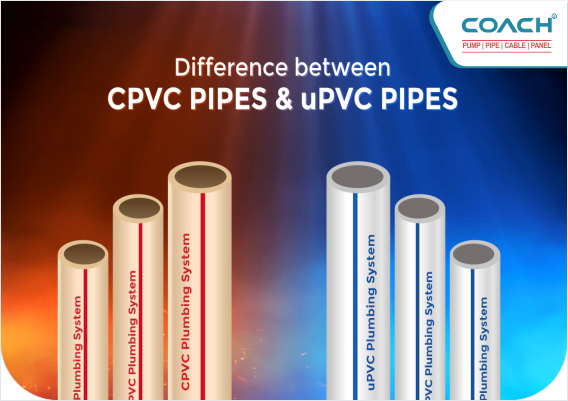Know the Major Differences Between CPVC Pipes and PVC Pipes
- March 25, 2023
- Category :Pipes

Introduction:
When it comes to selecting pipes for plumbing and other applications, understanding the differences between various materials is essential. Two commonly used options are CPVC (Chlorinated Polyvinyl Chloride) and PVC (Polyvinyl Chloride) pipes. While they may seem similar, there are distinct differences that make each suitable for specific purposes. In this blog post, we will explore the major differences between CPVC pipes and PVC pipes to help you make an informed decision for your plumbing needs.
- Composition:
The primary difference between CPVC and PVC pipes lies in their composition. PVC pipes are made from a polymerized vinyl chloride resin, while CPVC pipes are produced by adding chlorine to the PVC resin. The addition of chlorine makes CPVC pipes more durable and resistant to high temperatures, making them suitable for hot water applications.
- Temperature and Pressure Resistance:
One of the key advantages of CPVC pipes over PVC pipes is their ability to withstand higher temperatures and pressure. CPVC pipes can handle hot water up to 200°F (93°C), while PVC pipes are typically limited to carrying cold water. This temperature resistance makes CPVC pipes ideal for applications such as hot water supply lines, radiant heating systems, and industrial applications where higher temperatures are involved.
- Chemical Resistance:
Both CPVC and PVC pipes offer excellent resistance to corrosion and chemicals. However, CPVC pipes have superior chemical resistance compared to PVC pipes. CPVC is highly resistant to acids, alkalis, salts, and many other chemicals commonly found in plumbing systems. This makes CPVC pipes a preferred choice for industrial and commercial applications where exposure to harsh chemicals is expected.
- Flexibility:
PVC pipes are generally more rigid and less flexible than CPVC pipes. While PVC pipes work well for applications where rigid pipes are required, such as underground sewer lines or irrigation systems, CPVC pipes offer greater flexibility. This flexibility makes CPVC pipes easier to install, especially in situations that involve curves or bends. CPVC pipes can be easily cut and joined using solvent cement or mechanical fittings.
- Cost:
In terms of cost, PVC pipes are generally more affordable than CPVC pipes. PVC is widely available and has been used in plumbing systems for many years, resulting in lower production costs. On the other hand, CPVC pipes, with their added benefits and higher temperature resistance, tend to be slightly more expensive. However, the price difference may vary depending on the location and availability of the pipes.
Final Thoughts:
Understanding the major differences between CPVC pipes and PVC pipes is crucial when selecting the right material for your plumbing needs. While both types offer corrosion resistance and durability, CPVC pipes excel in higher temperature applications and have superior chemical resistance. PVC pipes, on the other hand, are cost-effective and suitable for cold water applications. Consider the specific requirements of your project, such as temperature, pressure, and chemical exposure, to determine the most suitable choice. Consulting with plumbing professionals can provide valuable insights and ensure that you select the right type of pipe for your specific needs.
The sort of pipes you select will be determined by your specific needs. You can reach out to us at Coach Pipes for further information, and we’ll be pleased to assist you!






